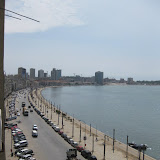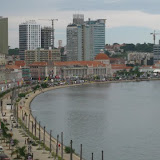For those more accustomed to the typical winter weather, celebrating in the heat and humidity of the summer makes it more difficult to imagine the time of the year. We attended a Christmas choral event at the British Embassy but even that had little impact on our holiday mood. However, in Luanda, there are Christmas lights on the streets and commercials for goods with the traditional carols on the radio. The street vendors carry small artificial trees up and down the street selling to those waiting in the unending traffic congestion. The one mall in Angola boasts an impressive Christmas display (but without Santa) where families come to enjoy and snap pictures.
This also represents the year anniversary of my arrival in Angola Thanksgiving week 2009. As documented, this year has been an interesting and challenging experience; certainly one that neither Jim nor I could imagine the specifics of the events that have unfolded. For now, we are content with our decision and look forward to more ongoing adventures.
Jim and I enjoyed our travel to the US in September. Coming back into the country through immigration for the first time on a diplomatic passport was emotional as the immigration agent welcomed and thanked me for serving my country. We had the opportunity to see family and many friends while enjoying the transitional weather of the Fall season. It is always interesting to see familiar places such as in Cincinnati in a different light after being away in a new environment. Adrian and Colin traveled to Minneapolis for a family reunion with us as well as with my sister Monica and her husband Tom. This was their last week living in the Twin Cities as they have moved to Portland, Oregon.
 |
| From family 2010 |
Although the trip home was nice, the two very long journeys were exhausting. Since I had two long flights (each way), I had the opportunity to have an overnight “rest stop’. This time I took advantage of it on the way back staying overnight in Paris (Jim did not do this as we did not fly the same route). Although it was not restful, it was nice to have a day to spend in the Louvre and stroll about the streets of Paris.
Back in Angola, we had another opportunity to see the countryside with the Angolan Field Group. This 3 day trip took us east to Mélange to witness the demining operations being performed by the Norwegian People’s Aid (NPA) group. Along the way we stopped at the Kalundula water falls and Pedras Negras where I visited last year.
During the 30 years of war, mines as well as a myriad of traditional ammunition and explosives were used by both sides of the conflict making Angola one of the most heavily mined countries in the world. Large portions of the country are still not accessible to the population due to these mines and explosive remnants of war, and it is estimated that one fifth of the population has its day to day life affected by them. The NPA, along with a number of other agencies and the government are involved in the process of demining. While the government focuses mostly on the demining around infrastructure (dams, bridges, and electric lines), other agencies like NPA and the Halo Trust attempt to secure land so the people may return. Unfortunately, funding for many of these agencies has declined since the global financial crises. Additionally, donors feel that as Angola is pumping 2 million barrels of oil a day, they should take more responsibility in returning the land to its people. Princess Diana visited Angola in 1997 bringing the tragedy of landmines here and other countries to the forefront.
As the US State Department is the largest donor to NPA, some of the Embassy staff involved with this grant has visited this operation. The Angolan Field Group had the rare opportunity to undertake a similar day long tour and we were lucky to be included.
Our tour was led by a Bosnian technical operator and the Angolan director of operations. The Bosnian had been involved in mining his own country during their war and afterwards suffered a partial leg amputation when he was involved in the demining of the same area. His injury was a result of not following his own rules when performing such operations. The NPA has an incredible safety record in Angola with only one injury in the last few years. Once again, it was a result of the individual not following the safety rules. Luckily, it was not a life threatening injury to this arm and he was able to return to having almost full use of the limb. Although we did not venture into the specific area where land mines were still present, we were taken into a cleared area and received demonstrations on the process. Only a few meters separated us from the cleared and uncleared areas. After the demonstration, we were taken to a village not far away that was able to return and begin construction on their new homes. The scope of the work is daunting and it is estimated it will take many years and much money to return most of the land to the Angolan people.
The remaining part of our trip took us to some of the loveliest natural resources of Angola. This time, Jim got to enjoy them as well as drive the Land Rover a number of hours on unpaved roads. Additionally, we made some new friends from all over the US and Europe in our group mostly working in the oil industry. Having friends in this business and with NGO groups puts a different perspective on each industry.
Jim was invited by the regional medical officer in Nigeria to come to Lagos to perform psychological testing on children from the Consulate there. In the end, he tested 7 children in 5 days. This may be an opportunity for him to provide such a service to other missions in the future. It was an interesting experience for him to travel alone in Africa and see another African country. Due to the routing of the flights, he had to spend an overnight in Johannesburg. There, he had his first experience in South Africa, so much different from the rest of Africa.
Our life in Luanda has become routine for the most part. Due to the logistics of the city, including safety and traffic, we find ourselves limited in our easy mobility. The Marginal was closed a few months ago as it is being extended into the Bay; we lost our easy and safe place to walk in town We now walk in our Miramar neighborhood and drive to a particular beach on the weekends if only to just to be able to walk free of the congestion. Driving somewhere requires energy and patience; at times it doesn’t seem worth it. We visit or have friends over for dinner versus going to a restaurant where we are unsure of the quality for a grand sum of money. With each of our roles, Jim and I have become the twin support group. We are organizing a water aerobics class at the Embassy pool and trying to offer ways for people to deal with the stress of life here. The annual Marine Ball that commemorates the founding of the Marines (235 years) takes places at most embassies in the world was held in November. We enjoyed a lovely evening with Americans and others from Luanda.
 |
| Marine Ball |
The sights and sounds around Miramar have become routine. As there are many homes of wealthier people here, each home has a guard(s) out front. They have their ways to keep themselves occupied during the long hours with radios, TVs and conversation 24 hours a day. There are parties, sometimes loud and late in private homes or the expensive reception facility down the street. The small public park echoes with the voices of children or adults playing soccer or enjoying each other’s company. Our building is adjacent to a public maternity hospital. So, depending on where your windows face, there are different sounds. In the front of the facility, women and children camp out on the side walk on a very busy street waiting for family members to deliver the baby. Those overlooking the facility can hear the screams of the women during labor while we hear the cries of the families and friends as they take away the coffins of the mothers or babies from the back of the hospital. At 6 a.m. many days of the week, the “mourning ladies”, I call them, come to wail as they retrieve the bodies of their loved ones. I am amazed at the numbers of women and infants who die as a result of childbirth. But, this is life in a third world country which is the largest oil producer in Africa.
Here are some more views of Luanda we see everyday. We marched in the annual AIDS (SIDA) march in the streets of Luanda. Another day we walked about downtown Luanda with our Portuguese teacher who filled us in on the history of the city.
On a more upbeat note, I have learned of my next assignment. We are very excited to be posted next in Ankara, Turkey for at least two years. The prospect of living in a place with history, culture, good food and relative safety is very exciting. The Embassy is much larger and I will be co-located with one of the regional medical doctors who travel to other embassies in the region. I hope to have a better balance of clinical and administrative work. We also hope Jim will have an opportunity to have clinical work as there is a large US military operation there. On the downside, we will return to colder winter weather as in Cincinnati, but the trade off is worth it. Hopefully, this will be a place where family and friends may want to come to visit us during this time.
I am uncertain the specific date I will leave Luanda but, most likely, it will be in July. We will have about a month of “home leave” before we are off to Ankara.
Both boys have also moved onto new adventures. Colin has remained in Wash DC for now and is working for a company administering aptitude tests and counseling on the results. He continues to study voice. He also moved into a new apartment in DC proper. Adrian left Clorox after 2+ years to take a job at the Lawrence Berkeley Labs. Besides having a fabulous view from the Berkeley hills, he hopes to enjoy a more technical job at this lab. He has applied to a number of graduate schools to begin work on a PhD in chemical engineering next fall.
We have planned a trip to Cape Town in mid January for 10 days—a needed escape. In April, I will attend our Med conference in Istanbul (how coincidental). Before we leave here, we also hope to travel to Botswana for a safari and cross to Zambia to see Victoria Falls. I believe time will go quickly over these next 6 months.








